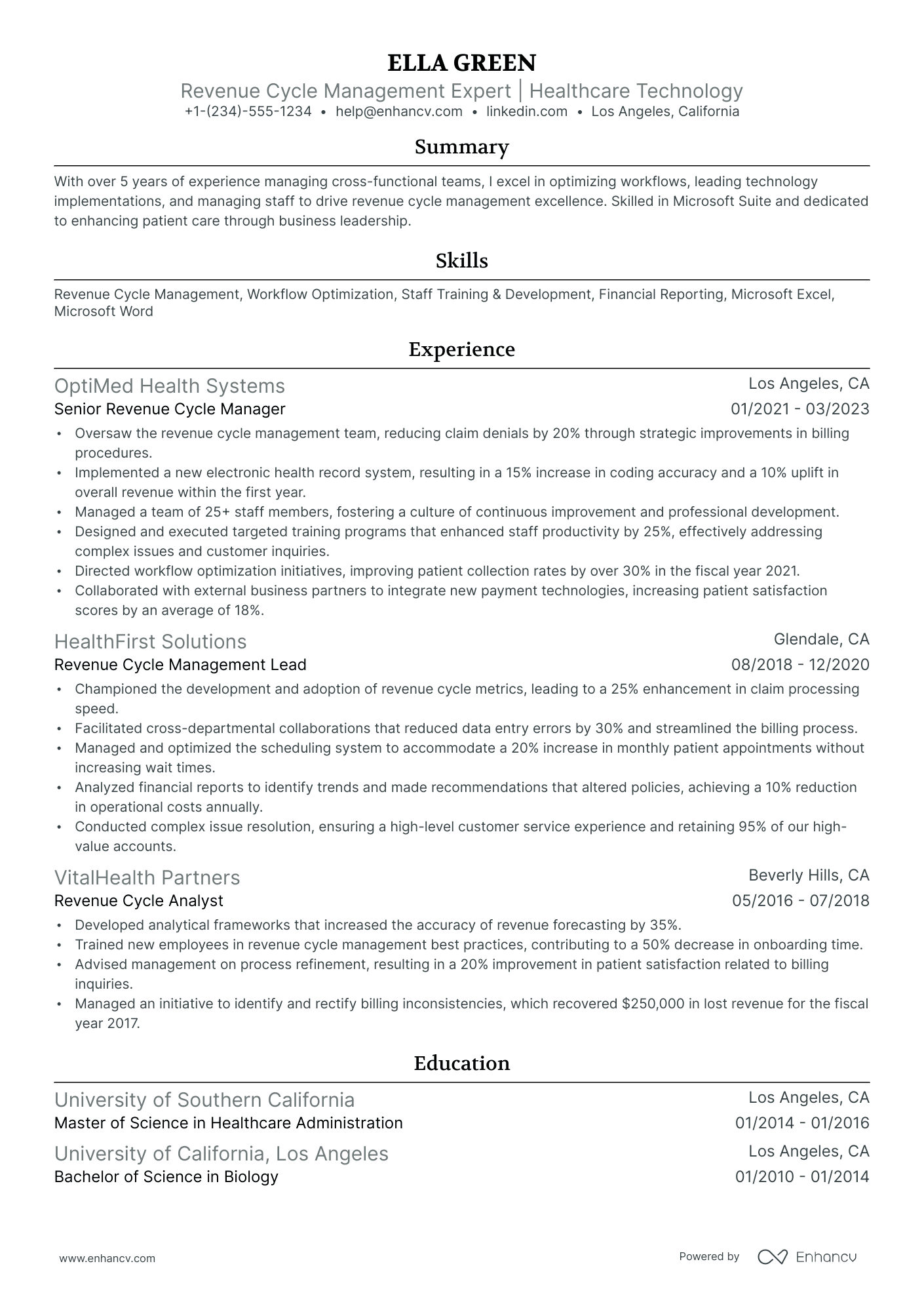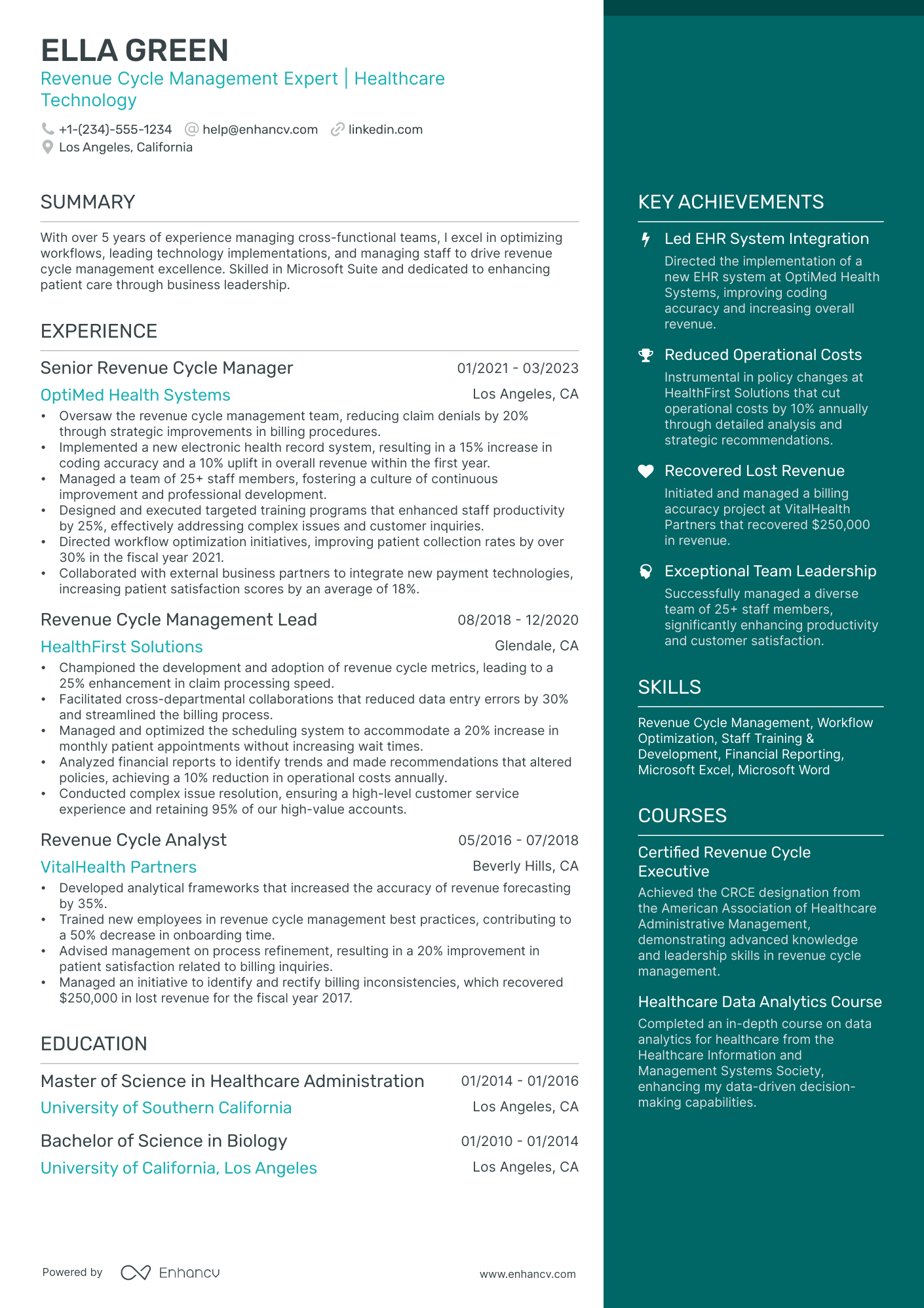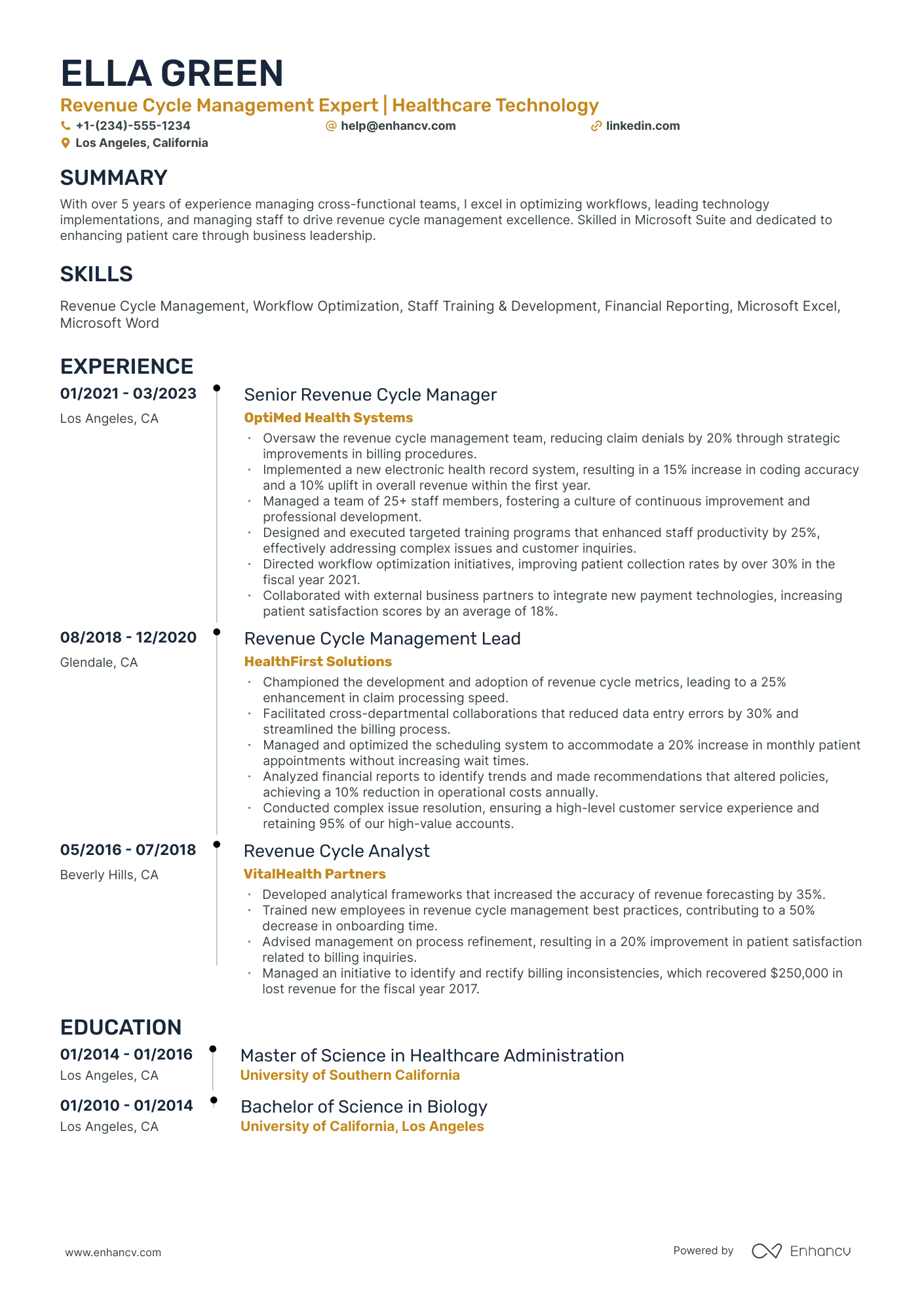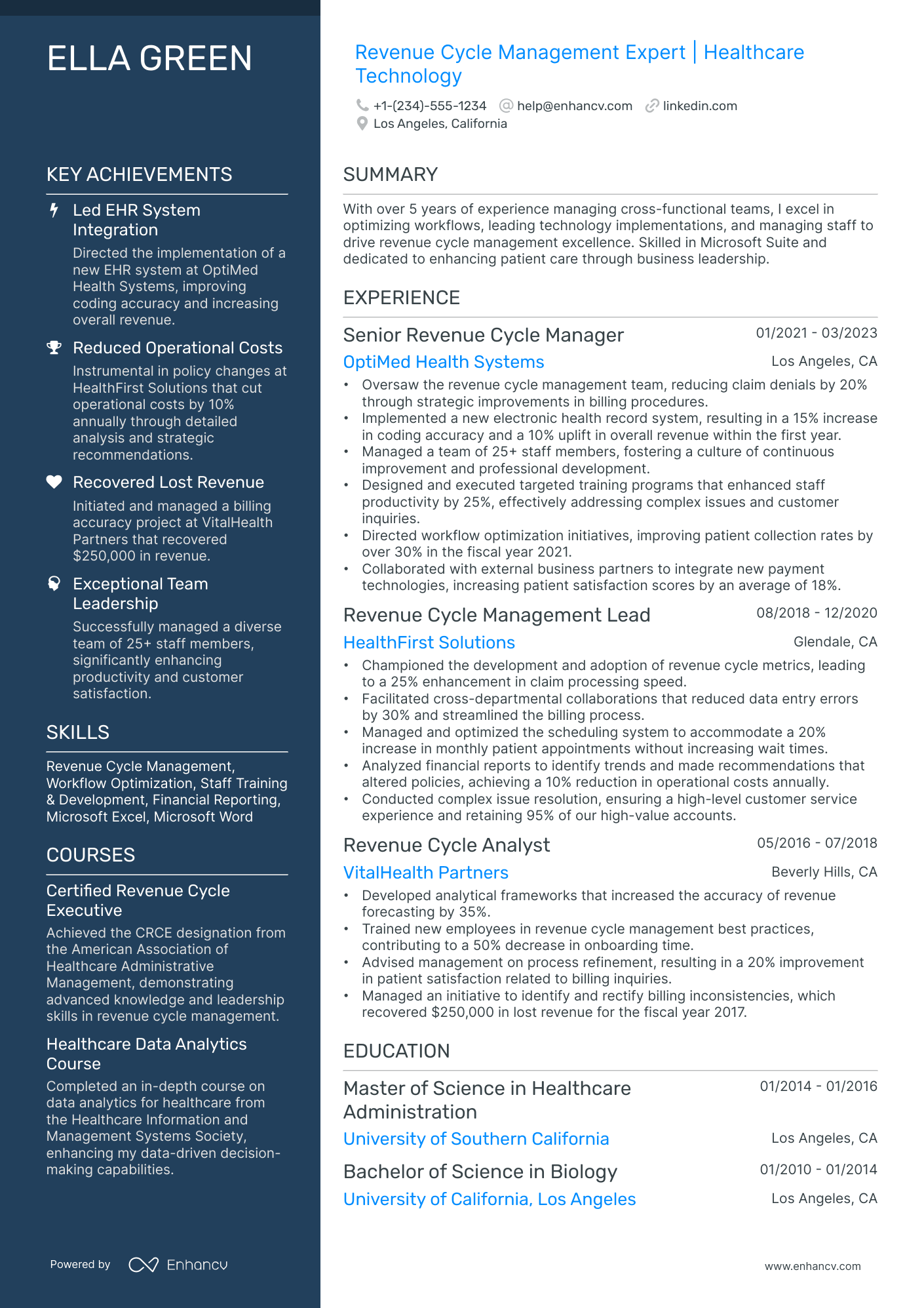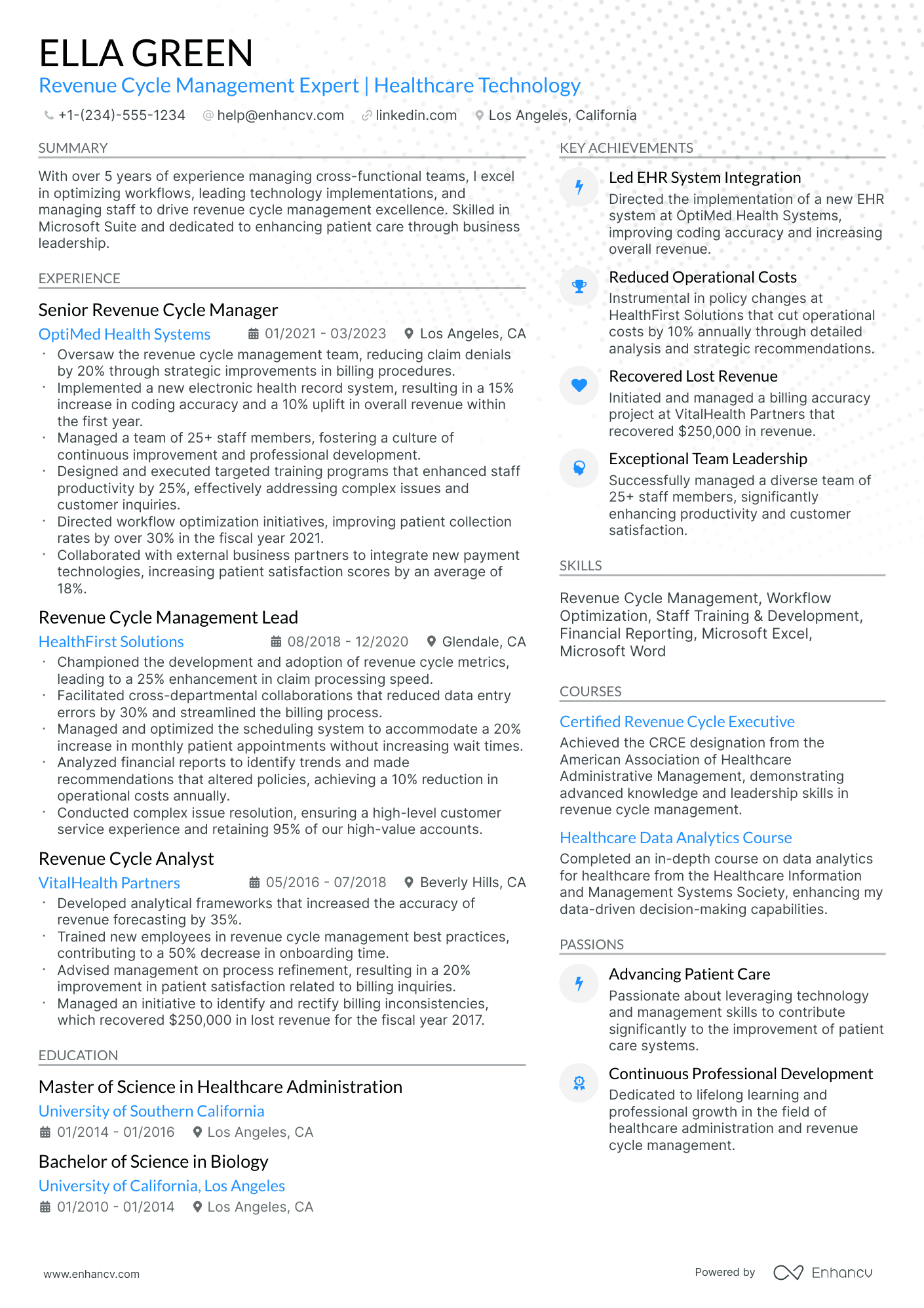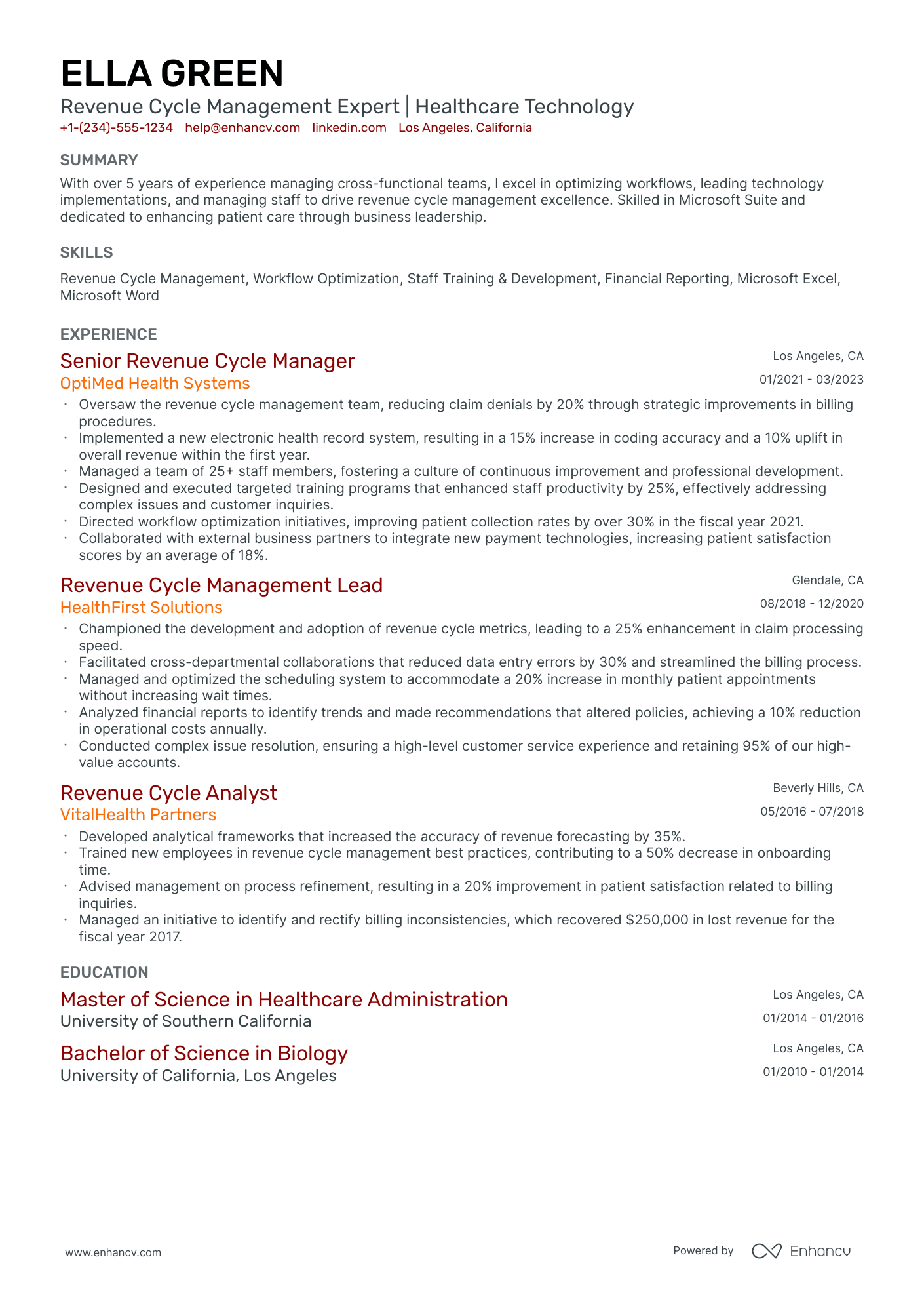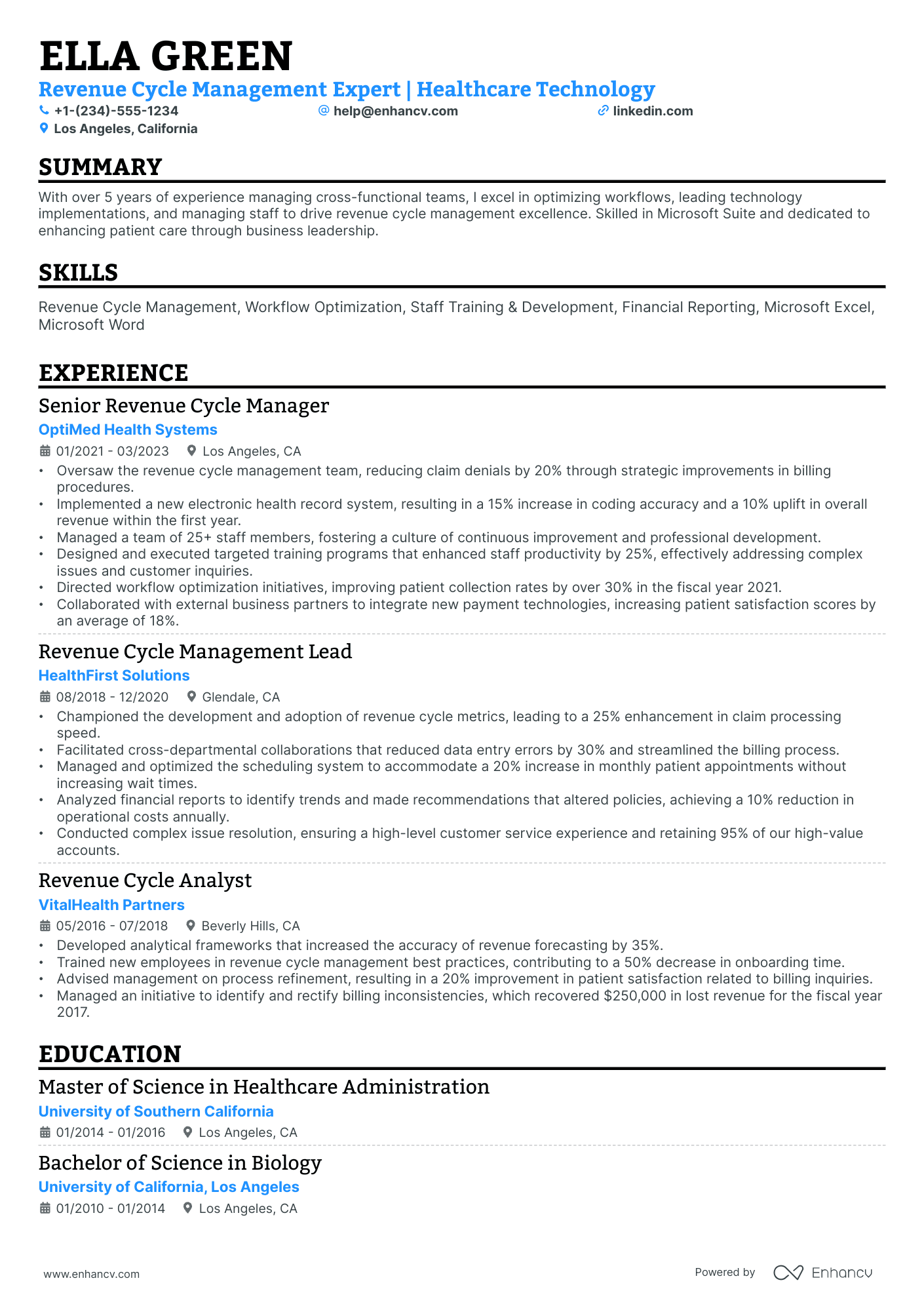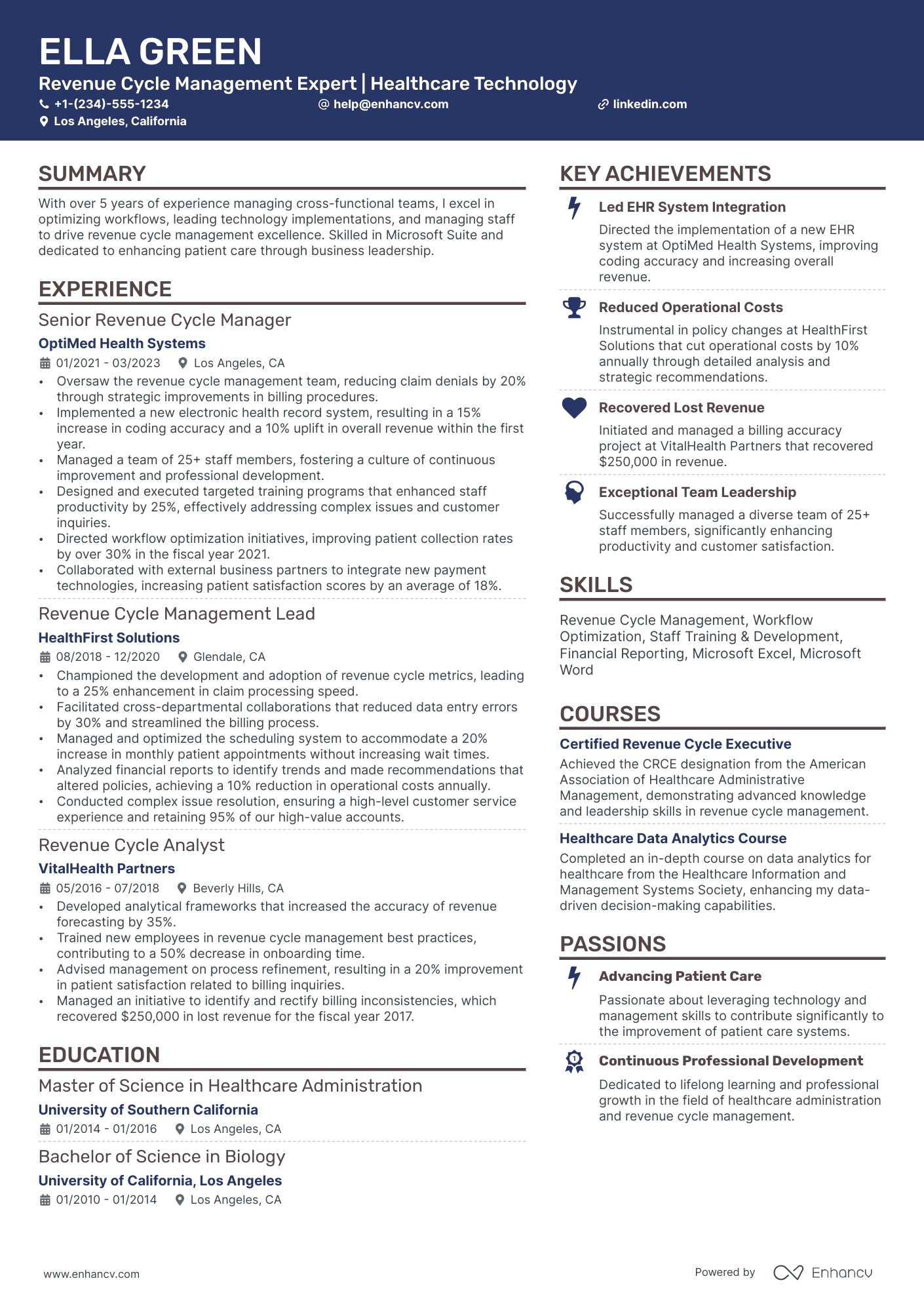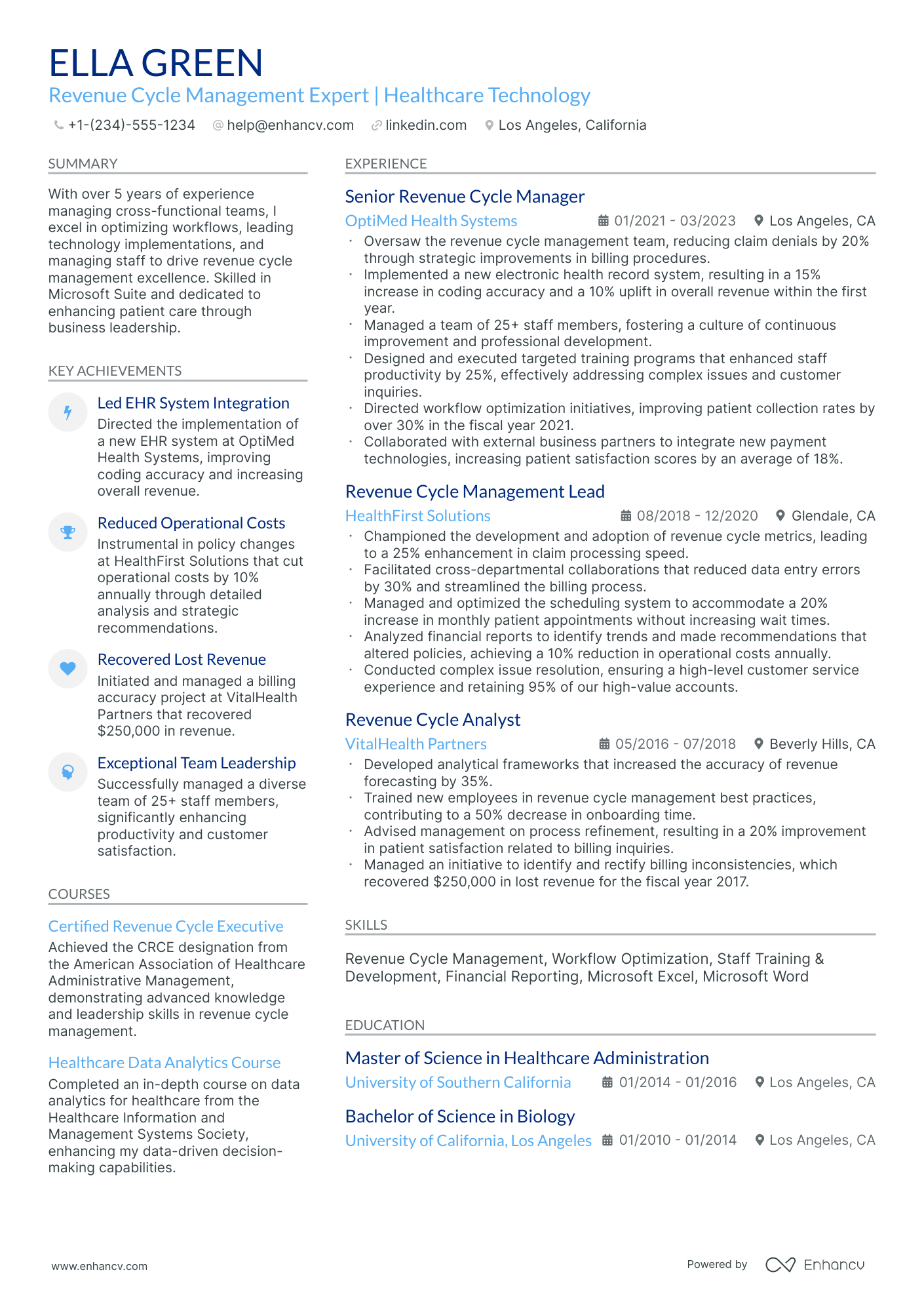Many revenue cycle manager resume submissions fail because they read like job descriptions, burying impact under tools and task lists. That hurts when an ATS filters for core skills and recruiters scan fast. Competition rewards clarity.
A strong resume shows what you changed and how it measured out. Knowing how to make your resume stand out starts with highlighting denial reduction, days in accounts receivable improvement, cash acceleration, clean claim rate gains, audit outcomes, and team scope. Tie results to payer mix and compliance risk.
Key takeaways
- Quantify every achievement with metrics like denial rates, A/R days, and dollars recovered.
- Use reverse-chronological format for senior roles and hybrid format for career changers.
- Tailor each resume to match the job posting's systems, KPIs, and payer terminology.
- Tie every listed skill to a specific action and measurable result in your experience section.
- Place certifications like CRCR or CHFP near education to reinforce credibility fast.
- Write a three-to-four-line summary that names your scope, tools, and strongest financial outcome.
- Use Enhancv to refine bullet points and align your resume with each role's requirements.
Job market snapshot for revenue cycle managers
We analyzed 145 recent revenue cycle manager job ads across major US job boards. These numbers help you understand employer expectations, industry demand, skills in demand at a glance.
What level of experience employers are looking for revenue cycle managers
| Years of Experience | Percentage found in job ads |
|---|---|
| 1–2 years | 28.3% (41) |
| 3–4 years | 3.4% (5) |
| 5–6 years | 32.4% (47) |
| 7–8 years | 0.7% (1) |
| 9–10 years | 4.8% (7) |
| 10+ years | 5.5% (8) |
| Not specified | 29.7% (43) |
Revenue cycle manager ads by area of specialization (industry)
| Industry (Area) | Percentage found in job ads |
|---|---|
| Finance & Banking | 68.3% (99) |
| Healthcare | 25.5% (37) |
Top companies hiring revenue cycle managers
| Company | Percentage found in job ads |
|---|---|
| Accenture | 26.9% (39) |
| Deloitte | 22.8% (33) |
Role overview stats
These tables show the most common responsibilities and employment types for revenue cycle manager roles. Use them to align your resume with what employers expect and to understand how the role is structured across the market.
Day-to-day activities and top responsibilities for a revenue cycle manager
| Responsibility | Percentage found in job ads |
|---|---|
| Revenue cycle management | 39.3% (57) |
| Epic | 31.7% (46) |
| Microsoft powerpoint | 25.5% (37) |
| Automation | 24.1% (35) |
| Sql | 23.4% (34) |
| Tableau | 23.4% (34) |
| Cerner | 22.8% (33) |
| Eclipsys | 22.8% (33) |
| Hboc | 22.8% (33) |
| Idx | 22.8% (33) |
| Invision | 22.8% (33) |
| Machine learning | 22.8% (33) |
Type of employment (remote vs on-site vs hybrid)
| Employment type | Percentage found in job ads |
|---|---|
| On-site | 85.5% (124) |
| Remote | 8.3% (12) |
| Hybrid | 6.2% (9) |
How to format a revenue cycle manager resume
Recruiters evaluating revenue cycle manager candidates prioritize evidence of end-to-end revenue cycle oversight, denial management leadership, process improvement initiatives, and measurable financial outcomes like reduced days in accounts receivable or improved net collection rates. Choosing the right resume format ensures these signals are immediately visible to both hiring managers and applicant tracking systems.
I have significant experience in this role—which format should I use?
Use a reverse chronological format to present your career progression and expanding scope across revenue cycle operations. Do:
- Lead with your most senior role and clearly define your scope of ownership—team size, revenue volume managed, number of facilities or payer contracts overseen.
- Highlight domain-specific expertise including claims management platforms (Epic, Cerner, Meditech), payer reimbursement methodologies, compliance frameworks (HIPAA, CMS guidelines), and denial resolution workflows.
- Quantify business impact through metrics tied to collections performance, denial rate reduction, cash acceleration, and cost-to-collect improvements.
I'm junior or switching into this role—what format works best?
Use a hybrid format that leads with a targeted skills section and follows with a concise work history to bridge experience gaps. Do:
- Place core competencies—medical billing and coding, charge capture, payer follow-up, denial trend analysis—near the top so recruiters and ATS software register them immediately.
- Feature relevant projects or transitional experience, such as leading a billing audit, implementing a new practice management system, or completing revenue cycle certification coursework.
- Connect every skill to a specific action and a measurable result, even if the scope is smaller than a senior role.
Why not use a functional resume?
A functional format strips away the timeline and context that hiring managers need to evaluate your growth trajectory, hands-on billing operations experience, and reliability in managing revenue cycle workflows.
- A functional resume may be acceptable if you're transitioning from a clinical billing, health information management, or medical coding role and have limited direct revenue cycle management experience—but only if you tie every listed skill to specific projects, measurable outcomes, or relevant certifications rather than presenting skills in isolation.
With your format established, the next step is filling it with the right sections to present your qualifications effectively.
What sections should go on a revenue cycle manager resume
Recruiters expect to see a clean, results-focused resume that shows you improve cash flow, reduce denials, and strengthen billing and compliance performance. Understanding what to put on a resume for this role is essential.
Use this structure for maximum clarity:
- Header
- Summary
- Experience
- Skills
- Projects
- Education
- Certifications
- Optional sections: Awards, leadership, languages
Your strongest experience bullets should emphasize measurable revenue impact, denial reduction, days in accounts receivable improvements, compliance outcomes, and the scope of teams, systems, and payer mixes you managed.
Is your resume good enough?
Drop your resume here or choose a file. PDF & DOCX only. Max 2MB file size.
Once you’ve organized your resume with the right structure and supporting details, focus next on writing your revenue cycle manager resume experience so each role clearly reflects that framework.
How to write your revenue cycle manager resume experience
The work experience section is where you prove you can manage the full revenue cycle—from patient registration through final payment—using the tools, workflows, and leadership approaches that drive real financial outcomes. Hiring managers prioritize demonstrated impact over descriptive task lists, so every bullet should connect what you did to a measurable result.
Each entry should include:
- Job title
- Company and location (or remote)
- Dates of employment (month and year)
Three to five concise bullet points showing what you owned, how you executed, and what outcomes you delivered:
- Ownership scope: the revenue cycle functions, billing systems, payer portfolios, denial management programs, or teams you were directly accountable for as a revenue cycle manager.
- Execution approach: the tools, technologies, and methods you used to drive decisions—such as EHR and practice management platforms, claims scrubbing software, coding frameworks, audit protocols, or data analytics dashboards relevant to revenue cycle operations.
- Value improved: the specific changes you created in areas like clean claim rates, days in accounts receivable, denial turnaround times, cash collection efficiency, compliance accuracy, or reimbursement reliability.
- Collaboration context: how you partnered with clinical departments, coding teams, payer representatives, compliance officers, IT stakeholders, or executive leadership to resolve bottlenecks and align revenue cycle performance with organizational goals.
- Impact delivered: the outcomes your work produced, expressed through financial results, operational scale, process improvements, or business impact rather than a list of daily activities—tying every result back to the health of the revenue cycle you managed.
Experience bullet formula
A revenue cycle manager experience example
✅ Right example - modern, quantified, specific.
Revenue cycle manager
Riverview Medical Group | Austin, TX
2022–Present
Multi-specialty outpatient network with twelve clinics and a centralized billing office processing 55,000+ claims per month.
- Led end-to-end revenue cycle optimization across Athenahealth and Waystar, cutting days in accounts receivable from forty-eight to thirty-six and improving cash collections by 11% year over year.
- Rebuilt denial management workflows using Claim Adjustment Reason Code (CARC) and Remittance Advice Remark Code (RARC) analytics in Excel and Tableau, reducing denial rate from 9.2% to 6.1% and recovering $1.3M in underpayments.
- Implemented charge capture controls with electronic health record (EHR) and practice management edits, increasing clean claim rate from 86% to 93% and reducing rework time by 220 hours per month.
- Partnered with clinical leaders, coders, and compliance to tighten Current Procedural Terminology (CPT) and International Classification of Diseases, Tenth Revision (ICD-10) accuracy, improving audit pass rate from 91% to 97% and lowering takeback risk by 28%.
- Negotiated payer issue resolution with top five commercial plans and trained a nine-person billing team on updated escalation playbooks, cutting average appeal turnaround time from twenty-one to fourteen days.
Now that you've seen how a strong experience section comes together, let's look at how to adjust yours to match the specific role you're targeting.
How to tailor your revenue cycle manager resume experience
Recruiters evaluate your revenue cycle manager resume through both applicant tracking systems and manual review, so tailoring your resume to the job description matters. Tailoring your experience section ensures your qualifications connect directly to what each employer prioritizes.
Ways to tailor your revenue cycle manager experience:
- Match billing platforms and EHR systems named in the job description.
- Mirror the exact payer mix or reimbursement models the employer references.
- Use identical terminology for denial management or claims resolution processes.
- Highlight HFMA or AAHAM credentials when the posting lists them.
- Quantify improvements using the same KPIs the job description specifies.
- Emphasize compliance with HIPAA and payer-specific regulatory standards mentioned.
- Reference cross-functional collaboration with clinical or coding teams if noted.
- Include experience with revenue integrity audits or charge capture workflows requested.
Tailoring means aligning your real accomplishments with each job's stated requirements, not forcing disconnected keywords into your experience.
Resume tailoring examples for revenue cycle manager
| Job description excerpt | Untailored | Tailored |
|---|---|---|
| Oversee end-to-end revenue cycle operations, including charge capture, claims submission, and denial management using Epic systems | Managed billing operations and helped improve department processes. | Directed end-to-end revenue cycle operations—charge capture, claims submission, and denial management—across three hospital facilities using Epic, reducing claim denial rates by 18% within 12 months. |
| Lead A/R follow-up strategy to maintain days in accounts receivable (DAR) below 40 days and reduce aged receivables over 90 days | Worked on accounts receivable tasks and supported collections efforts. | Built and executed an A/R follow-up strategy that maintained DAR at 36 days and cut aged receivables over 90 days by 25%, recovering $2.1M in outstanding balances. |
| Collaborate with payer contracting and compliance teams to ensure accurate reimbursement aligned with managed care agreements | Communicated with different teams to resolve payment issues. | Partnered with payer contracting and compliance teams to audit reimbursement accuracy against 12 managed care agreements, identifying $850K in underpayments and securing corrected remittance within 60 days. |
Once you’ve aligned your experience with the role’s priorities, the next step is to quantify your revenue cycle manager achievements so hiring teams can see the results you delivered.
How to quantify your revenue cycle manager achievements
Quantifying your achievements proves you improved cash flow, reduced denials, and lowered compliance risk. Focus on days in accounts receivable, clean claim rate, denial rate, net collection rate, underpayment recovery, and audit outcomes.
Quantifying examples for revenue cycle manager
| Metric | Example |
|---|---|
| Days in A/R | "Reduced days in accounts receivable from 52 to 39 in six months by tightening charge capture and follow-up workflows in Epic Resolute." |
| Denial rate | "Cut initial denial rate from 12.4% to 8.1% by rebuilding denial codes, adding workqueues, and coaching seven billers on root-cause fixes." |
| Net collections | "Raised net collection rate from 94.6% to 97.2% by standardizing payer escalation, improving documentation, and tracking variances in Tableau dashboards." |
| Underpayment recovery | "Recovered $1.3M in underpayments in two quarters by auditing top five payers, correcting contract terms, and enforcing timely appeal submissions." |
| Compliance risk | "Passed a payer audit with zero findings by updating Medicare medical necessity checks, tightening access controls, and maintaining 100% documentation for 120 sampled claims." |
Turn your everyday tasks into measurable, recruiter-ready resume bullets in seconds with Enhancv's Bullet Point Generator.
With strong bullet points in place, the next step is ensuring your skills section presents the right mix of hard and soft skills that revenue cycle manager roles demand.
How to list your hard and soft skills on a revenue cycle manager resume
Your skills section shows you can protect cash flow and compliance, and recruiters and applicant tracking systems scan them to confirm you match the job post; aim for a balanced mix of revenue cycle hard skills and job-critical soft skills.
revenue cycle manager roles require a blend of:
- Product strategy and discovery skills.
- Data, analytics, and experimentation skills.
- Delivery, execution, and go-to-market discipline.
- Soft skills.
Your skills section should be:
- Scannable (bullet-style grouping).
- Relevant to the job post.
- Backed by proof in experience bullets.
- Updated with current tools.
Place your skills section:
- Above experience if you're junior or switching careers.
- Below experience if you're mid/senior with strong achievements.
Hard skills
- Epic Resolute PB, HB
- Cerner Patient Accounting
- CPT, ICD-10-CM, HCPCS
- Claim edits, scrubbers
- Denial management workflows
- AR aging, cash forecasting
- Charge capture, CDM maintenance
- Contract modeling, payer fee schedules
- Prior authorization, eligibility verification
- Medicare, Medicaid, commercial billing
- HIPAA, CMS compliance
- SQL, Excel, Power BI
Soft skills
- Drive cross-functional alignment
- Lead payer escalation calls
- Translate data into actions
- Prioritize high-impact work
- Set clear performance expectations
- Coach billers and collectors
- Negotiate with payers and vendors
- Communicate policy changes clearly
- Run root-cause reviews for denials
- Hold owners accountable to deadlines
- Partner with clinical leadership
- Make risk-based decisions
How to show your revenue cycle manager skills in context
Skills shouldn't live only in a bulleted list on your resume. Explore resume skills examples to see how top candidates integrate them throughout their documents.
They should be demonstrated in:
- Your summary (high-level professional identity)
- Your experience (proof through outcomes)
Here's what that looks like in practice.
Summary example
Revenue cycle manager with 10+ years in hospital systems, skilled in Epic billing workflows, denial management, and cross-departmental collaboration. Reduced A/R days by 18% while leading a 12-member team through a full EHR migration.
- Reflects senior-level experience clearly
- Names industry-relevant tools directly
- Quantifies a meaningful financial outcome
- Highlights leadership and collaboration
Experience example
Revenue Cycle Manager
Lakeview Regional Health System | Charlotte, NC
June 2018–March 2024
- Partnered with clinical and coding teams to redesign charge capture workflows, cutting unbilled accounts by 32% within nine months using Epic Resolute.
- Led payer contract modeling in Excel and Tableau, identifying $1.4M in underpayments and recovering 89% through structured appeals.
- Trained 15 billing specialists on updated CMS compliance protocols, reducing claim denial rates from 12% to 6.5% in one fiscal year.
- Every bullet includes measurable proof
- Skills surface naturally through outcomes
Once you’ve tied your revenue cycle manager abilities to measurable outcomes and real work examples, the next step is applying that approach to a resume when you don’t have direct experience.
How do I write a revenue cycle manager resume with no experience
Even without full-time experience, you can demonstrate readiness. Building a resume without work experience is possible through:
- Revenue cycle internship or externship.
- Billing and coding coursework projects.
- Claims denial appeals case studies.
- Electronic health record sandbox training.
- Revenue cycle manager shadowing hours.
- Volunteer medical office billing support.
- HIPAA compliance training certificate.
- Healthcare finance capstone analysis.
Focus on:
- Quantified outcomes from projects.
- Payer rules and denial workflows.
- Electronic health record and billing tools.
- Compliance, privacy, and audit readiness.
Resume format tip for entry-level revenue cycle manager
Use a skills-based resume format because it highlights relevant projects, tools, and results when your work history is limited. Do:
- Add a "Projects" section with metrics.
- List tools: Epic, Cerner, Excel.
- Include payer, denial, and appeal terms.
- Show process steps: charge capture to posting.
- Match keywords from the job post.
- Built an Excel denial tracker from case studies, categorized fifty denials by reason code, and improved first-pass resolution from seventy percent to eighty-six percent.
Even without direct experience, your educational background can serve as the foundation of your resume—here's how to present it effectively.
How to list your education on a revenue cycle manager resume
Your education section helps hiring teams confirm you have the foundational knowledge needed for a revenue cycle manager role. It validates your academic background quickly.
Include:
- Degree name
- Institution
- Location
- Graduation year
- Relevant coursework (for juniors or entry-level candidates)
- Honors & GPA (if 3.5 or higher)
Skip month and day details—list the graduation year only.
Here's a strong education entry tailored to a revenue cycle manager resume.
Example education entry
Bachelor of Science in Healthcare Administration
University of Central Florida, Orlando, FL
Graduated 2018
GPA: 3.7/4.0
- Relevant Coursework: Healthcare Finance, Medical Billing Systems, Health Information Management, Revenue Cycle Operations
- Honors: Magna Cum Laude, Dean's List (six consecutive semesters)
How to list your certifications on a revenue cycle manager resume
Certifications show a revenue cycle manager's commitment to learning, proficiency with billing and compliance tools, and alignment with healthcare revenue cycle standards.
Include:
- Certificate name
- Issuing organization
- Year
- Optional: credential ID or URL
- Place certifications below education when your degree is recent and your certifications add supporting value.
- Place certifications above education when they are recent, role-relevant, or required for the revenue cycle manager role.
Best certifications for your revenue cycle manager resume
Certified Revenue Cycle Representative (CRCR) Certified Revenue Cycle Professional (CRCP) Certified Professional Coder (CPC) Certified Coding Specialist (CCS) Certified Healthcare Financial Professional (CHFP) Certified Patient Account Representative (CPAR) Certified Compliance & Ethics Professional (CCEP)
Once you’ve positioned your credentials so they’re easy to verify, use the next section to craft a revenue cycle manager resume summary that reinforces that qualification upfront.
How to write your revenue cycle manager resume summary
Your resume summary is the first thing a recruiter reads, so it must immediately signal your value. A strong opening positions you as a qualified revenue cycle manager before the rest of your resume is even scanned.
Keep it to three to four lines, with:
- Your title and total years of experience in revenue cycle management.
- Domain expertise, such as hospital billing, payer relations, or physician group operations.
- Core tools and skills like Epic, Cerner, claims adjudication, or denial management.
- One or two quantified achievements, such as reduced A/R days or improved net collections.
- Soft skills tied to real outcomes, like cross-functional leadership that streamlined workflows.
PRO TIP
At a mid-level management position, emphasize operational ownership and measurable financial results. Highlight team leadership, process improvements, and revenue impact. Avoid vague descriptors like "detail-oriented" or "passionate professional." Replace them with concrete accomplishments that prove your ability to manage complex billing cycles and drive collections performance.
Example summary for a revenue cycle manager
Revenue cycle manager with eight years optimizing end-to-end billing operations in acute care settings. Led a 12-member team using Epic to reduce A/R days by 18% and recover $2.4M in underpayments.
Optimize your resume summary and objective for ATS
Drop your resume here or choose a file.
PDF & DOCX only. Max 2MB file size.
Now that your summary captures your professional value, make sure your header presents your contact details clearly so recruiters can actually reach you.
What to include in a revenue cycle manager resume header
A resume header lists your key identity and contact details, boosting visibility, credibility, and fast recruiter screening for a revenue cycle manager role.
Essential resume header elements
- Full name
- Tailored job title and headline
- Location
- Phone number
- Professional email
- GitHub link
- Portfolio link
Including a LinkedIn link lets recruiters verify your experience fast and supports consistent screening.
Don't include photos on a revenue cycle manager resume unless the role is explicitly front-facing or appearance-dependent.
Keep your header aligned with revenue cycle manager keywords and match your job title to the posting for faster sorting in recruiter searches.
Revenue cycle manager resume header
Jordan Taylor
Revenue Cycle Manager | Denials Management, Claims Optimization, Patient Billing
Chicago, IL
(312) 555-01XX
jordan.taylor@enhancv.com
github.com/jordantaylor
jordantaylor.com
linkedin.com/in/jordantaylor
Once you’ve set a clear context with your identifying details and role focus, add these additional sections to round out your revenue cycle manager resume with supporting information.
Additional sections for revenue cycle manager resumes
Adding extra sections strengthens your resume when they highlight specialized expertise or credibility directly relevant to revenue cycle management.
- Languages
- Certifications and licenses
- Professional affiliations (such as HFMA or AAHAM membership)
- Publications or conference presentations
- Awards and recognitions
- Continuing education
- Volunteer experience in healthcare finance
Once you've rounded out your resume with the right supplementary sections, it's worth pairing it with a cover letter to strengthen your overall application.
Do revenue cycle manager resumes need a cover letter
A cover letter isn't required for a revenue cycle manager, but it helps in competitive postings or when employers expect it. If you're unsure what a cover letter is or when to use one, it can make a difference when your resume doesn't fully show context, leadership scope, or alignment with the organization's billing goals.
Use a cover letter when it adds details your resume can't:
- Explain role or team fit: Connect your experience to the organization's payer mix, denial drivers, and collaboration with coding, clinical, and finance teams.
- Highlight one or two relevant projects or outcomes: Describe a specific improvement, such as reducing denials, speeding cash posting, or raising clean claim rates.
- Show understanding of the product, users, or business context: Reference the systems and workflows you'll support, like the electronic health record, patient access, and billing vendors.
- Address career transitions or non-obvious experience: Clarify a move from analyst to revenue cycle manager, a specialty change, or a non-healthcare background with transferable results.
Drop your resume here or choose a file.
PDF & DOCX only. Max 2MB file size.
Whether you submit a cover letter or not, using AI to improve your revenue cycle manager resume helps you refine your content and tailor it faster to each role.
Using AI to improve your revenue cycle manager resume
AI can sharpen your resume's clarity, structure, and impact. It helps tighten language and highlight measurable results. But overuse strips authenticity. Once your content feels clear and role-aligned, step away from AI. For practical guidance, explore these ChatGPT resume writing prompts tailored for resume improvement.
Here are 10 practical prompts to strengthen specific sections of your revenue cycle manager resume:
- Strengthen your summary. "Rewrite my resume summary to highlight my experience as a revenue cycle manager, emphasizing leadership scope, revenue impact, and payer expertise in three concise sentences."
- Quantify experience bullets. "Review these revenue cycle manager experience bullets and suggest where I can add specific metrics like denial rates, collection percentages, or dollars recovered."
- Tighten action verbs. "Replace weak or passive verbs in my revenue cycle manager experience section with strong, specific action verbs tied to billing, collections, and reimbursement outcomes."
- Align skills strategically. "Compare my skills section against this revenue cycle manager job description and recommend which skills to add, remove, or reorder for stronger alignment."
- Refine project descriptions. "Rewrite this project description to clearly show my revenue cycle manager role, the problem addressed, actions taken, and measurable financial outcomes."
- Improve certification context. "Add brief context to each certification listed on my revenue cycle manager resume explaining how it applies to revenue cycle operations or compliance."
- Clarify education relevance. "Revise my education section to emphasize coursework or training directly relevant to a revenue cycle manager role in healthcare finance."
- Eliminate filler language. "Identify and remove vague or redundant phrases across my entire revenue cycle manager resume without losing any meaningful content or accomplishments."
- Target denial management. "Rewrite these experience bullets to better showcase my revenue cycle manager expertise in denial prevention, root cause analysis, and appeals resolution."
- Tailor for ATS clarity. "Restructure my revenue cycle manager resume formatting and keyword placement so applicant tracking systems can accurately parse my qualifications and experience."
Stop using AI once your resume sounds accurate, specific, and aligned with real experience. AI should never invent experience or inflate claims—if it didn't happen, it doesn't belong here.
Conclusion
A strong revenue cycle manager resume centers on measurable outcomes, role-specific skills, and clean structure. Lead with results like lower denial rates, faster days in accounts receivable, and stronger cash collections. Support them with expertise in billing, coding, payer follow-up, compliance, and team leadership.
Keep your resume easy to scan and consistent from top to bottom. Use clear sections, focused bullets, and accurate metrics that show impact. This approach signals you’re ready for today’s hiring market and near-future expectations.
